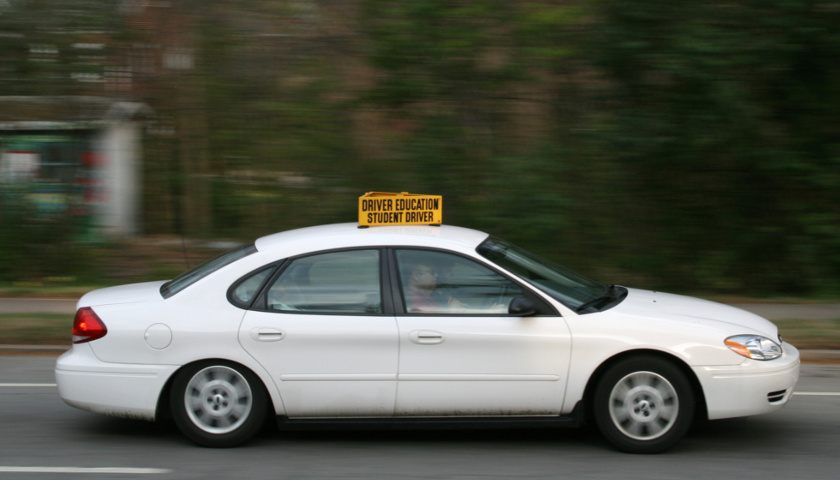Ladies and gentlemen, start your engines!
With that little phrase, we are off to the races to get to our morning destination—work, school or other location. I have been driving since I was 13 years old, and legally since I was 16. I have never seen worse drivers in my lifetime, all across the state and nation. Every time I get behind the wheel I say a silent prayer, “Dear Lord, please don’t let me be run-over by the idiots today and keep me and others safe out there.”
I remember when driving a vehicle was a privilege, first granted to me by my parents and then recognized by those who issued a license. In fact, driving a car is not a right promised to every person, but rather a privilege granted to people who complete certain requirements. In the legal arena, even the US Supreme Court says that citizens do not have a fundamental “right to drive.” In Dixon v. Love, 431 U.S. 105, 112-16, 97 S.Ct. 1723, 52 L.Ed.2d 172 (1977), the Supreme Court held that a state could summarily suspend or revoke the license of a motorist who had been repeatedly convicted of traffic offenses with due process satisfied by a full administrative hearing available only after the suspension or revocation had taken place. The Court conspicuously did not afford the possession of a driver’s license the weight of a fundamental right. (See also Mackey v. Montrym, 443 U.S. 1, 10, 99 S.Ct. 2612, 61 L.Ed.2d 321 (1979); Bell v. Burson, 402 U.S. 535, 539, 542-43, 91 S.Ct. 1586, 29 L.Ed.2d 90 (1971).)
Tennessee does mandate that in order to get an Intermediate Driver’s License, a minor must have certified 50 hours of supervised behind-the-wheel experience, including 10 hours at night. The Tennessee Department of Safety only requires students to complete a driver’s education course if they have been convicted of multiple moving violations while they are operating on their intermediate restricted license. It is time to re-think that policy. It is currently not a requirement in order for a minor child to obtain a permit or license to successfully complete a driver’s education course. Nobody disputes that it is an important resource that can help students become responsible and safe drivers. Should we restrict student access on our school campuses until they can prove to be responsible and safe drivers? Should driver’s education course be required? How can we prove or truly verify the supervised behind the behind-the-wheel or night experience?
From a school safety perspective, school district policy should require a student pass a driver’s education course before being allowed to drive to/from school or park their vehicle on school grounds. This class could also be offered during the summer or through any of the legitimate driving schools across the state. The objective should not be to save parents a few dollars on auto insurance, it must be to improve driving, reduce accidents and injuries and ultimately save lives. We all benefit by learning defensive driving techniques and other safe driving skills that will last a lifetime.
The rules of the road are also shifting. We all face obstacles in an increasingly challenging driving environment, especially with more inexperienced drivers on the roads. Texting in driving, is one of the most distracting items a driver can do. Phone use – particularly calling and texting – while driving is one of the most common distractions. New technologies bring even greater challenges with distracted drivers. New technology in vehicles is not always to our benefit, “infotainment” dashboards GPS maps and other hands-free technology may actually impede smart driving and safety. Multitasking technology is about convenience, not safety. Good driving habits require training and repetition. A driver’s education course is a beneficial choice for drivers of any age and experience levels. However, it should be required for all minors navigating our roads. It is time to re-think our policies before the next generation starts their engines. Lives most certainly will depend on it.
– – –
JC Bowman is the Executive Director of Professional Educators of Tennessee, a non-partisan teacher association headquartered in Nashville, Tennessee. Permission to reprint in whole or in part is hereby granted, provided that the author and the association are properly cited. For more information on this subject or any education issue please contact Professional Educators of Tennessee.









Mr. Bowman – What provoked you to address this topic? Are people being killed or maimed on school grounds by licensed students at a rate that inordinately excessive compared to other locations? Do not get me wrong. I am all for formal driver education and safe driving practices – although I was not required to take a formal class before demonstrating that I had a passable knowledge of traffic laws and could operate a vehicle safely and thereby awarded my driver’s license. What I am questioning is the prospect of public schools in establishing more stringent requirements upon student drivers than those established by the state authorities. That really seems to be a overreach.
Kids die everyday in auto accidents. What provoked me to address this topic?
>Over 37,000 people die in road crashes each year
>An additional 2.35 million are injured or disabled
>Over 1,600 children under 15 years of age die each year
>Nearly 8,000 people are killed in crashes involving drivers ages 16-20
>Road crashes cost the U.S. $230.6 billion per year, or an average of $820 per person
>Road crashes are the single greatest annual cause of death of healthy U.S. citizens traveling abroad
The question to ask, why has it taken so long to address this issue? Overreach to think that before we allow kids to drive to school, we require them to take a basic drivers education course? Not hardly. Seems like common sense. The fact, we can do it without passing legislation seems like a better strategy.
Thanks for reading! JC
,
Thank you for the statistics. But can you enumerate how many of those people are killed or injured because a student did not take a formal driver’s ed class? The point I wanted to make is simply that schools should deal with schooling and the state should establish the requirements for acquiring a driver’s license. It would appear to me that the schools have a difficult enough time dealing with academics and in-class discipline without becoming traffic cops.
A valid concern. I think it is a discussion we must have. Everyday in Nashville I see people on their cell phone weaving in and out of traffic. I think a red light has become a suggestion to a few. You ask? “can you enumerate how many of those people are killed or injured because a student did not take a formal driver’s ed class?” No, because that data is not collected to my knowledge. However, I will bet you the adult beverage of your choice (coffee or cheap beer) that those who undertake a Driver’s Ed program, either through schools or any of the legitimate driving schools across the state, that it makes a student safer behind the wheel. Now what do we do with all those folks already on the road who may have moved here or are not native? I got no answer for that. But when 1/4 of car wrecks are attributed to 16-20 year-old kids, maybe we need to take a hard look at it. Thanks, JC
Mr. Bowman. Thank you for your thoughtful response. I also am lacking any supportive data but personal experience strongly suggests to me that the high incidence of wrecks attributed to those 16-20 years old has infinitely more to do with immaturity resulting in poor judgment than the lack of having received formal driver’s ed. But, my real point remains that public schools should not take on the role of traffic cop. With that I will close out my part of this conversation. Again, thank you for the thoughtful exchange of ideas.
The driving age needs to be raised to 21. And background checks.